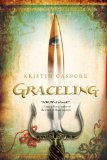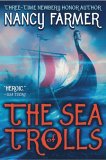Summary | Excerpt | Reading Guide | Reviews | Beyond the book | Read-Alikes | Genres & Themes | Author Bio

Joanne Harris has already proved her versatility with her books
for adults such as
Chocolat (1999),
Five Quarters of the Orange (2001),
Holy Fools (2004) and
Gentlemen and Players (2006); now she breaks new territory with a novel
for teens - and what a great read it is!
500 years after Ragnarok (the end of the world according to Norse mythology),
Maddy Smith lives a quiet life in a sleepy village a long way from the center of
power at World's End. So far away that even the Examiners of "The
Order" rarely visit; so while the "ruinmark" on Maddy's hand and her
inquisitive nature have caused
her to be set apart from the others in the village, who believe imagination to
be a sin, with some even mumbling "witch"
behind her back, at least she has been saved from the Cleansing which would
definitely have resulted if the Order were aware of her
presence.
The setting feels like a small village somewhere in a rocky, hilly and bleak
part of the North of England a couple of hundred years ago; but happily Harris saves us from any ye-oldy-worldy
speechifying and instead has her characters speak in good solid modern-day
speech with a Northern bluntness; and whenever the plot looks like it's in danger of taking itself to
seriously, she lightens things with a good laugh - ensuring that Runemarks
is better compared to Rick Riordan's "Percy Jackson and the Olympians"
series than to
weighty tomes such as "The Lord of The Rings".
"Hel's living eye twitched in growing annoyance. Tricks? she thought. What does he think the others use? Does he really think Freya's hair was ever naturally that shade? Or that Sif's waist doesn't benfit from a little tight lacing?"
In Runemarks, the Norse gods come alive in all their bickering glory, but
not until quite late in the tale, after we've had time to get to know Maddy and her strange
itinerant friend, One-Eye, who turns up for a few days each year and trains her
in the use of glamours (an archaic word for magic spells or enchantments).
What starts as a potentially simple story, quickly builds to one of considerable
complexity when Maddy leaves the Middle World of men for the goblin-infested
tunnels that lead to World Below; and interestingly, the conclusion is
neither a "happily ever after" nor an obvious lead into a series - certainly
there's plentiful material to create more stories in the same "world', but it's not at all clear that
Harris has plans to do so.
This will be a great choice for almost any young reader who enjoys fantasy, including the many still mourning the end of the Harry Potter series, especially those who have a smattering of an understanding
of Norse mythology, either from reading a classic such as
D'Aulaires' Book of Norse Myths, or from books such as
The Sea of Trolls or the Riordan novels mentioned earlier. It also has great 'cross-over' potential for adult readers. We read Runemarks as a family, and all of us from 12 to 48 enjoyed it immensely. Harris's extensive knowledge of Norse mythology is worn lightly but with authority and she does not compromise her writing style for younger readers, neither in terms of vocabulary nor syntax.
"The river [of Dream] itself is really nothing like a river. Although the eye gives it a river's length and breadth, what flows along it is strangely volatile, shining, mercurial, almost alive, ready to take shape whenever it touches a stray thought."

The Story Behind The Book
Joanne Harris first full-length novel was a sprawling 1000- page monster called
Witchlight, written when she was nineteen and rejected by every
publisher; but before that Joanne doodled her way through school creating
complicated comic-strips inspired by Astérix but starring the Norse Gods
who she found "more
attractive somehow, funnier and more human and hugely more dramatic" than the
Greek and Roman gods. The only problem was that there weren't enough
stories, so the young Joanne busied herself writing more, all set in a post-Ragnarok
world in which the gods did not die as was prophesized, but instead survived
with reduced powers.
A few years ago, she dragged the manuscript of Witchlight out of its drawer and read it aloud to her daughter, Anouchka,
who loved it so much that Joanne started another story just for fun, and just
for family consumption. She says, "It felt like playing
truant, somehow; and besides, I was enjoying it so much – and so was she – that
to tell my publishers about it would have spoilt the fun. But Anouchka wouldn't
let it go." In the end her daughter got her way, and the result is Runemarks.
![]() This review was originally published in The BookBrowse Review in February 2008, and has been updated for the
November 2009 edition.
Click here to go to this issue.
This review was originally published in The BookBrowse Review in February 2008, and has been updated for the
November 2009 edition.
Click here to go to this issue.

If you liked Runemarks, try these:

by Kristin Cashore
Published 2009
Katsa has been able to kill a man with her bare hands since she was eight - she’s a Graceling, one of the rare people in her land born with an extreme skill. And now she is forced to work as the king’s thug. But she never expects to fall in love with beautiful Prince Po...

by Nancy Farmer
Published 2006
The year is A.D. 793; Jack and his sister have been kidnapped by Vikings and taken to the court of Ivar the Boneless and his terrifying half-troll wife; but things get even worse when Jack finds himself on a dangerous quest to find the magical Mimir's Well in a far-off land, with his sister's life forfeit if he fails.
Your guide toexceptional books
BookBrowse seeks out and recommends the best in contemporary fiction and nonfiction—books that not only engage and entertain but also deepen our understanding of ourselves and the world around us.